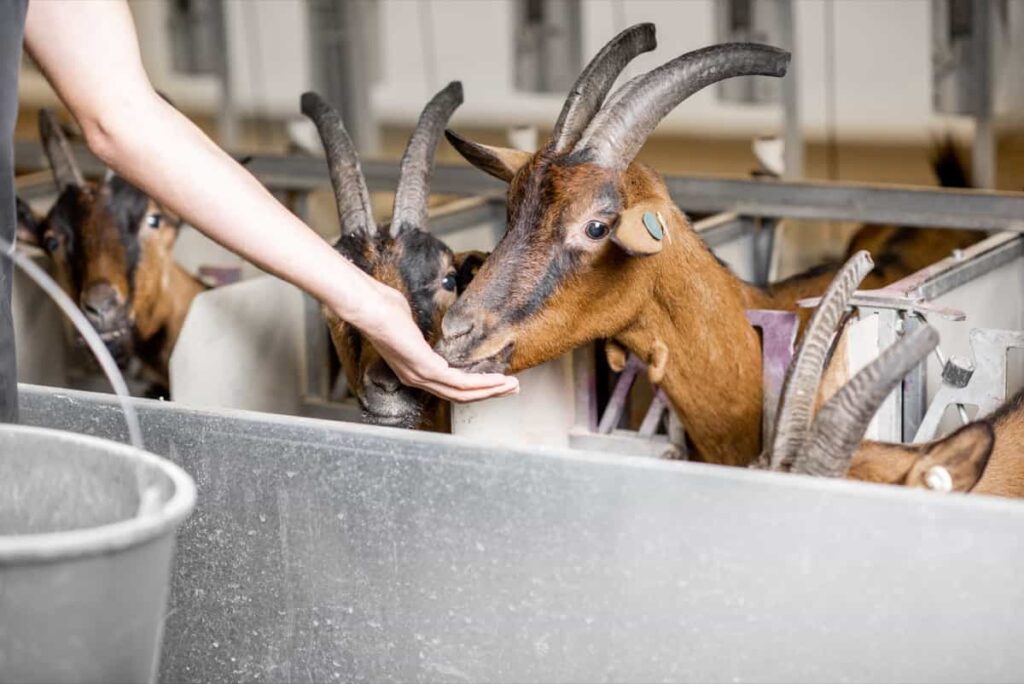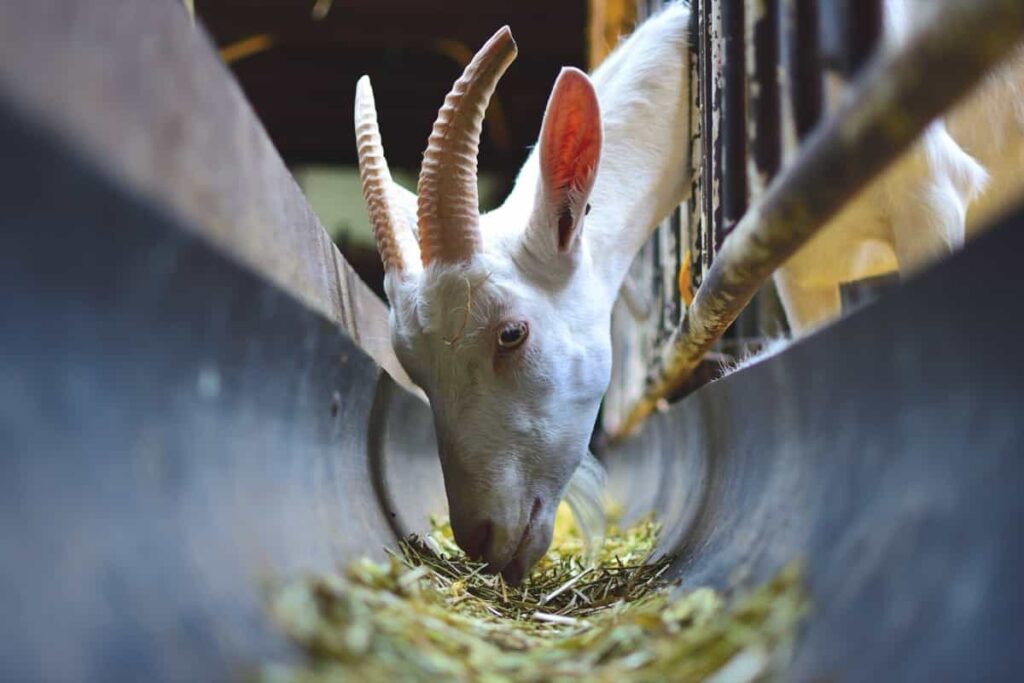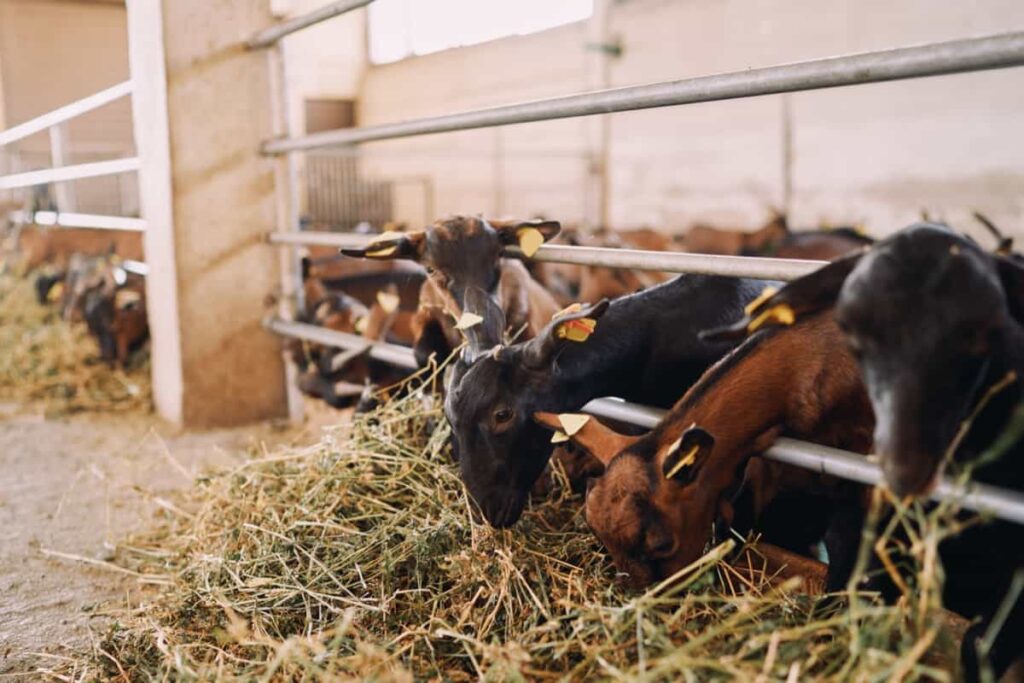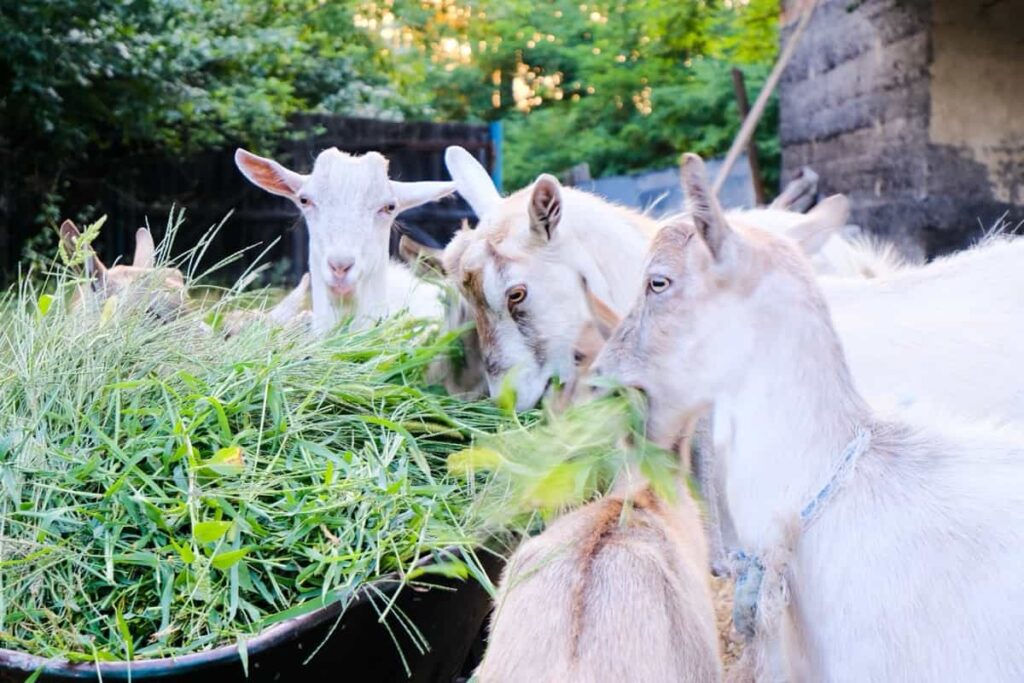It’s crucial to know the nutritional needs of goats to ensure they reach their optimal weight and stay healthy. In this article, we will explain various goat feed options that can help your goats reach their optimal weight and maintain good health.

Understanding Goat Nutrition Basics
it’s essential to know that goats are ruminants, meaning they have a complex digestive system. This system requires a proper balance of nutrients for optimal health and weight gain. In addition to protein, goats require energy sources such as grains or corn to fuel their daily activities and promote healthy weight gain. Balancing these energy sources with fiber-rich foods like hay helps maintain digestive health. Vitamins and minerals are also vital for goats’ overall well-being.
The Importance of Protein in Weight Gain
Protein plays a vital role in helping goats achieve weight gain effectively. Adequate protein intake is crucial for supporting growth and development in goats. Not all proteins are created equal, so it’s important to provide high-quality sources like soybean meal or alfalfa pellets to ensure optimal results.
Goats require a higher percentage of protein compared to other livestock species due to their unique digestive system and metabolic needs. Whether you opt for commercial feeds rich in protein or include natural sources like legumes in their diet, prioritizing this essential nutrient is key to promoting healthy weight gain in goats.
Optimal Energy Sources for Goats
Goats require energy-rich foods to support weight gain and overall health. Grains like corn, barley, and oats are excellent sources of energy for goats. These grains provide carbohydrates that can be easily converted into fuel for the goat’s daily activities. Additionally, high-quality hay such as alfalfa or clover can serve as an energy source for goats. Hay is rich in fiber and nutrients, making it a great option for helping goats maintain energy levels throughout the day.
Another important consideration is offering access to fresh pasture. Grazing on lush grass provides goats with natural sources of energy from the sun and soil. Supplementing goat diet with a balanced commercial feed that includes grains, vitamins, and minerals can ensure they receive all the nutrients for optimal energy levels.
Balancing Fiber Intake for Digestive Health
Fiber is important to maintaining a healthy gut environment by promoting proper digestion and nutrient absorption. Including high-quality sources of fiber, such as hay, grass, and leafy greens, in your goat’s diet can help regulate its digestive system and prevent issues like bloating or constipation. It also helps keep your goat feeling full and satisfied throughout the day.
In case you missed it: Ultimate Guide to Kinder Goats: Raising, Breeding, Feeding, Care, Milk, and Meat Production

However, it’s important not to overdo it with fiber-rich foods as excessive fiber intake can lead to nutrient deficiencies and hinder weight gain efforts. Finding the right balance between fiber content and other nutrients is key to promoting overall well-being in your goats.
Essential Vitamins and Minerals for Goats
Vitamins such as A, D, and E play key roles in goat metabolism and immune function. They can be found in fresh green forage or commercial supplements. Minerals like calcium, phosphorus, and selenium are vital for bone strength, muscle function, and disease prevention in goats. Providing mineral blocks or adding mineral mixes to feed can help meet these needs. Vitamin and mineral deficiencies can lead to growth stunts, weakened immunity, and reproductive issues in goats. Regularly assessing your herd’s nutrient intake is essential for optimal health.
Commercial Feed Options for Weight Gain
Numerous choices are available on the market. Commercial feeds are formulated to provide the nutrients and energy levels required for optimal weight gain in goats. They often come in pellet or grain form, making them easy to administer and ensuring that each goat gets a balanced diet.
Some commercial feeds are specifically designed for different stages of growth, so make sure to choose one that fits your goat’s current needs. Consult with a veterinarian or nutritionist if you’re unsure about which commercial feed option would be best suited for your goats’ weight gain goals.
Formulating Homemade Weight Gain Diets
It can be a cost-effective option to help them reach their optimal weight. When creating these diets, it’s important to focus on providing a balanced mix of nutrients that cater to your goats’ specific needs. Start by including high-quality protein sources like soybean meal or alfalfa pellets to support muscle development and overall growth. Remember, fiber, including roughage like hay or grass in the diet, is crucial for maintaining digestive health and ensuring proper nutrient absorption.
Supplementing with Grazing and Foraging
Grazing allows goats to roam freely and nibble on a variety of grasses and plants, providing them with essential nutrients and fiber. Foraging in the pasture not only stimulates their instincts but also helps improve digestion and overall health. By incorporating grazing into their routine, you’re offering them a chance to diversify their diet while promoting exercise through movement.
This holistic approach to feeding encourages a balanced intake of nutrients from different sources, which can contribute to healthy weight gain over time. Additionally, allowing your goats access to fresh forage supports gut health by helping the growth of beneficial bacteria in their digestive system. It’s nature’s way of ensuring they get all the goodness they need to thrive.
Hydration and Its Role in Weight Management
Hydration plays a crucial role in goat weight management. Adequate water intake is important for digestion, nutrient absorption, and overall health. Goats should always have access to clean, fresh water to prevent dehydration and maintain proper bodily functions. During hot weather or when goats consume high-fiber diets, their water needs may increase. Monitoring water consumption and ensuring constant access to water sources is key to preventing issues like heat stress or digestive problems.
In case you missed it: Nubian Goat Feed Management: A Comprehensive Guide for Beginners

Proper hydration also aids in maintaining muscle mass and promoting weight gain in goats. Dehydrated animals are more prone to weight loss and other health complications, so it’s important to pay attention to their fluid intake. Keeping them well-hydrated is a simple yet critical aspect of managing their overall weight effectively.
Monitoring Weight and Adjusting Diets
Regularly weigh your goats to track their progress accurately. Adjust their diet based on their weight gain or loss trends to maintain optimal growth. When modifying their feeding regimen, consider factors like age, breed, activity level, and overall health. Talk with a veterinarian for expert advice on tweaking the goat feed options for better results. Keep detailed records of the changes made to the diet and monitor how each adjustment affects your goats’ weight gain over time.
In case you missed it: Boer Goat Feed Management: Understanding Feeding Requirements, Program, Schedule, and Rations

Assess the body condition score of your goats regularly by evaluating fat deposition along the ribs, spine, and tailhead areas. Use this visual assessment alongside regular weighing to fine-tune their feed plan accordingly. Providing your goats with a balanced diet not only promotes weight gain but also supports their overall health and vitality. By monitoring your goats’ weight regularly and making adjustments as needed, you can ensure they stay healthy and happy.
- Top Goat Breeds for Maximum Profitability
- Goat Feed Options for Weight Gain
- Types of Grass Growing for Goat Farm
- How to Train Goats for Milking: A Beginners Guide
- Goat Milking Practices and Equipment: A Beginner’s Guide
- Goat Farming for Fiber: Producing Mohair and Cashmere
- Maximizing Goat Milk Production: Tips for Dairy Goat Farmers
- Goat Farming as a Family Business: Strategies for Success
- Profitable Kenya Goat Breeds for Commercial Dairy and Meat Business